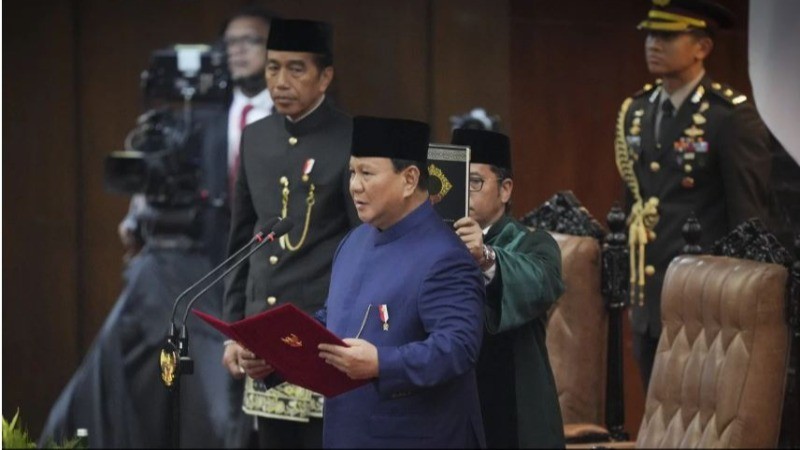
Prabowo Subianto has officially taken office as the new president of Indonesia, promising to serve all citizens, including those who did not support him. In his inaugural address, Prabowo emphasized his commitment to self-sufficiency and pledged to combat corruption, aiming to uplift the nation's poorest citizens.
"I will work to make Indonesia strong, prosperous, and independent," Prabowo stated. "We respect other nations and expect the same in return." He assured that Indonesia would maintain its non-aligned foreign policy and expressed a desire to be a supportive neighbor while advocating for oppressed people worldwide.
Dressed in a traditional black hat and a navy suit with a maroon and gold sarong, Prabowo thanked his predecessor, Joko Widodo, for steering Indonesia through significant challenges, including the COVID-19 pandemic, while keeping the nation politically and economically stable. "Widodo defeated me in the previous election, but he invited me to unite. Now I ask for the same spirit of unity from all of you," he said.
Prabowo, along with Vice President Gibran Rakabuming Raka, was sworn in during a ceremony attended by top Indonesian officials and foreign dignitaries, including representatives from China, the United States, and several Southeast Asian nations. Security was tight, with over 100,000 police and military personnel deployed in Jakarta.
Prabowo won the presidential election in February with approximately 58% of the vote, benefiting from Widodo's implicit support and selecting Gibran, Widodo's son, as his vice-presidential candidate. Unlike Widodo, who came from a humble background, Prabowo hails from a prominent political family and has had a long career in the military and politics.
Despite his past controversies, including allegations of human rights abuses during his military service, Prabowo has transformed his image, appealing to younger voters with a more moderate and relatable persona during his campaign. His relationship with Widodo has changed from rivals to allies, raising questions about how he will uphold the policies established by the outgoing president.
Prabowo's agenda includes significant campaign promises such as a free meal scheme for Indonesia's 83 million schoolchildren, which is projected to cost around 71 trillion rupiah (approximately $4.5 billion) in its first year. This initiative and other social programs will be crucial for maintaining his support among the populace.
While Prabowo plans to build upon Widodo's economic policies, including infrastructure projects, he may also place less emphasis on the Nusantara project, Widodo’s ambitious plan to relocate the capital, which carries a hefty price tag of $33 billion.
On the foreign policy front, Prabowo is expected to adopt a more proactive stance, aiming to strengthen Indonesia's international profile. He has expressed a desire to uphold good relations with both China and the United States while adhering to a neutral approach.
Prabowo's election manifesto envisions Indonesia as a respected and strong nation on the global stage, focused on security and peace. To achieve this vision, he has formed a coalition with seven political parties, controlling 82% of the parliamentary seats.
As he assembles his cabinet, Prabowo aims to include a diverse range of representatives from across Indonesia, with plans for a larger cabinet than his predecessor. This could create challenges in governance, requiring effective inter-ministerial coordination to implement his policies.
Observers anticipate that Prabowo's military background may lead to a more assertive and direct leadership style compared to Widodo. However, he may also adopt strategies from Widodo's administration, particularly in navigating criticisms and maintaining order.
As Prabowo embarks on his presidency, his ability to manage diverse interests and respond to any challenges will be closely watched.